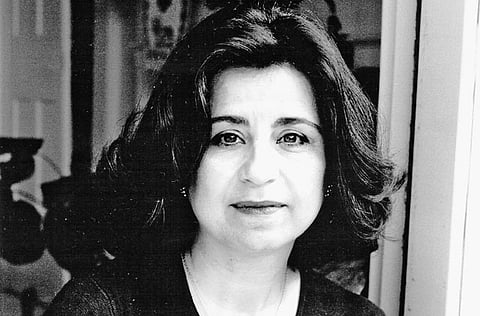In touch with Arab reality
Ahdaf Soueif says she felt a tremendous responsibility towards the Egyptian revolution and her fellow citizens

The Egyptian novelist and political and cultural commentator Ahdaf Soueif is a source of inspiration for young fiction and non-fiction writers in the UAE. Soueif has been awarded three honorary DLitts by British universities. She is a fellow of the Royal Society for Literature, and also a fellow of the Lannan Foundation for Cultural Freedom. In 2010, she won the first Mahmoud Darwish Award.
Weekend Review spoke to Soueif at the Sharjah International Book Fair 2011 in November.
As the author of the bestselling novel ‘The Map of Love', which was shortlisted for the Booker Prize in 1999 and then translated into more than 20 languages, you've become a role model for many promising young writers in the UAE. How would you explain to them this rise to global prominence?
I'd say the reasons for any of my successes are what make them like my work. I write from the heart, but I also work hard on the craft of writing.
You write in English. The Arabic-speaking readers, however, say they can still feel the Arabic soul.
That really pleases me. One of the things I work very hard at is to convey an Arab reality — use English to express an experience truly lived by an Arab character.
You played an essential role in the Egyptian revolution and you were the true voice of women angry and dissatisfied with the former regime. As an Arab woman, what did the experience mean to you?
I'm not sure if we participated in the revolution as women or as citizens. I think everyone had a role in those wonderful 18 days. But it's not over. We continue to work and perhaps what's coming is even more difficult than what's in the past.
What kind of impact has the event had on your writing?
I've just completed a book, Cairo: My City, Our Revolution. It's kind of a memoir, advocating the revolution, and embedded in the city and in my life. I think it's the most difficult thing I've ever done, both because the revolution is not over yet and because I felt a tremendous responsibility towards the revolution, Cairo, and my fellow citizens.
Tunisia's revolution created the thirst for change for many countries such as Egypt and continues to be an inspiration for other countries such as Yemen and Libya. Why do you think it has taken so long for political change to become a tangible reality?
The thirst for change has existed for a very long time. In Egypt, the revolution certainly didn't come out of nowhere. There has been discontent, protests and civil unrest ever since the marches in support of the second Palestinian Intifada at the end of 2000. In recent years every single segment of society was fighting the government, but separately. January 25 had all of them coming together, and many factors contributed. Tunis has the honour of having lit the spark. We shall always be grateful to our brothers and sisters there.
After the storms of revolution, will Arabs ultimately taste freedom?
Ultimately, yes. Not this moment. I'll give you an example. My nephew, Ala'a Abdul Fattah, is in jail, imprisoned by the military prosecutor because he rejects military trials for civilians. My sister started a hunger strike nine days ago. And recently, four people joined her. I have absolutely no doubt that we shall be free. But we still have to fight for it.
What advice would you give a young fiction writer?
The first piece of advice, really, is to read and read and read. It's like serving an apprenticeship. Read everything that your favourite authors have written. Think about the effect they have on you — and how they achieve these effects. Secondly, when you are writing about a situation, imagine it. Don't write out of theory; write as if you're telling something that is actually happening right there. Choose a friend whose judgement you trust and get them to read your work and critique it. Then think seriously about their critique.
Do you think a woman writer should go beyond the realm of literature to other issues of life, be it social or political, for example, without paying attention to the consequences?
Yes, of course. I think women, like men, can and should be active in any realm of life that they wish. But I don't think you should ever act without "paying attention" to the consequences. You should consider the consequences. You might decide to ignore the consequences, or you might try to work to change the consequences or to make them less serious. But these should be conscious and responsible decisions.
What are your forthcoming literary projects and engagements?
Well, I'm about to launch a collection of essays on the objects of the Museum of Islamic Art in Doha that I edited. Then, in January, Bloomsbury launches my Cairo book in London. I have to work on the Arabic version of the book. Then I turn my attention back to the novel that was interrupted by many things, the latest of which was the revolution in Egypt.
Fatma Salem is an Emirati writer based in Dubai


